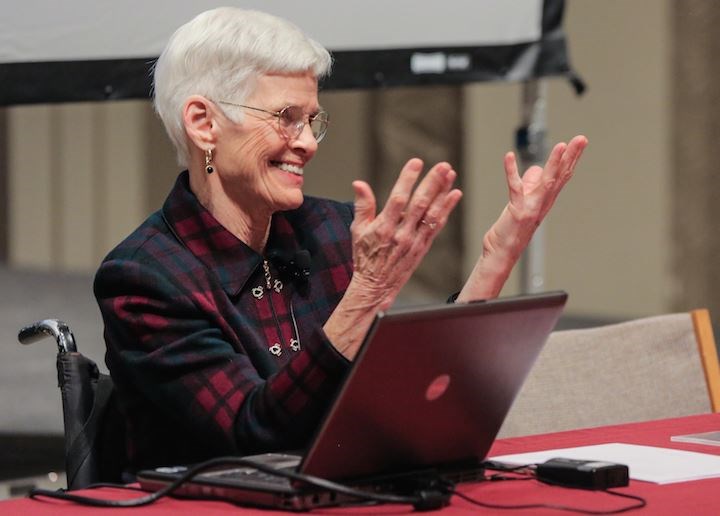Some months ago, I had the great good fortune to spend an evening with Judith Ann Mayotte (“Judy”), an experience that has changed my life forever. She is a living example of the human potential for peace and change in the world. So unique and grace-filled is her life, and so palpable are her personal strengths and gifts, that I believe the very act of sharing her life story will have a deep impact on MY HERO audiences around the world.
Judy’s life path of selfless service was created by one act after another of kindness, compassion, joy, and love. As her close personal friend Archbishop Desmond Tutu once said of her, “She’s a wonderful advertisement for God and goodness.”
Before I describe her background and achievements, let me say that this petite, graceful 79-year-old woman is visually stunning, with a beautiful, almost luminescent, face and smile. She has a calm voice that resonates as she speaks. Her spirit of joy and freedom is so striking that it takes a moment to register that she is confined to a wheelchair.
And yet that wheelchair is an important and inescapable part of her story. In 1993 she lost one of her legs in a catastrophic accident that occurred during her work with refugees in Sudan. A horrifying event, and certainly a turning point in her life, it was nevertheless but a small part of the larger story of a woman who has been shaped throughout her life by circumstance and grace, by her encounters with goodness and light, as well as her travels to dark places few dare to visit.
Although Judy’s life spans nearly eight decades to the present, it almost takes the appearance of several lifetimes, strung together like pearls on a single necklace, bound together by a common thread. Even before her near death-fatal experience in Sudan, her life had already been marked by a series of deeply transformative events. Yet, in the face of each of these challenges, her response has been to confront them with courage and hope, and then to let go and move forward. It is in this radical engagement of “letting go” that healing and new life have occurred. And therein lies one of the deepest lessons of her story.
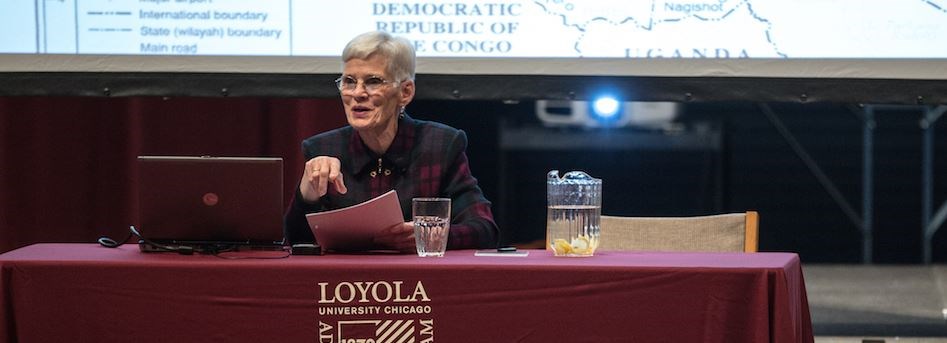 |
Judy, who was born in Wichita, Kansas, has described a very difficult childhood. Among other things, she contracted polio, and had to learn how to walk all over again. In 1958, at age 21, Judy entered the order of the Sisters of Charity of the Blessed Virgin Mary, a teaching order. She worked as a nun for ten years in suburban schools and in the inner city where, she states, she was first introduced to people on the margins of society. After deep personal contemplation she ultimately left the religious order. She subsequently entered Marquette University, earned a doctorate in Theology, and married the love of her life, Jack Mayotte, International Vice-President for Square D. After only three years of happy married life, Jack was diagnosed with cancer and passed away six weeks later. Characteristically, Judy faced this loss with courage and strength, moving forward to the next phase of her life.
In 1982 she became a Senior Researcher for Turner Broadcasting and worked on the documentary series, “Portrait of America.” She won an Emmy in 1985 for writing and producing the “Washington” segment of the series and soon thereafter joined the William Benton Fellowships Program in Broadcast Journalism at the University of Chicago as Associate Director, and later Acting Director. In 1989 she received a MacArthur Foundation grant to do research on refugees. She spent the next two years living among refugees in countries including Sudan, Eritrea, Pakistan, Thailand and Cambodia, resulting in 1992 in the publication of a book, Disposable People? The Plight of Refugees (Orbis Books). Apart from delving into the history, geopolitics, and social dimensions of the refugee crisis, her book offered an intimate, personal look at the meaning of displacement. The stories of shattered lives, violence, and sorrow are enormously moving. Strikingly, Judy’s words in the introduction contain a prophetic description of the watershed event that was to occur just one year later in her life.
“As I walked among these people--the refugees and internally displaced— they took me into their homes and shared their hopes and dreams and aspirations for a safe and dignified return to their homelands. They do have hopes and dreams.
They shared with me their meager food, their marriage and burial ceremonies, their laughter and their tears. I witnessed countless acts of human kindness and generosity, and I encountered the consequences of their anger taken out on someone close to them. Once I was with them, I could no longer think in terms of the masses and sheer numbers, nor could I distance myself from the magnitude of their suffering. What has happened to the world that people become disposable?
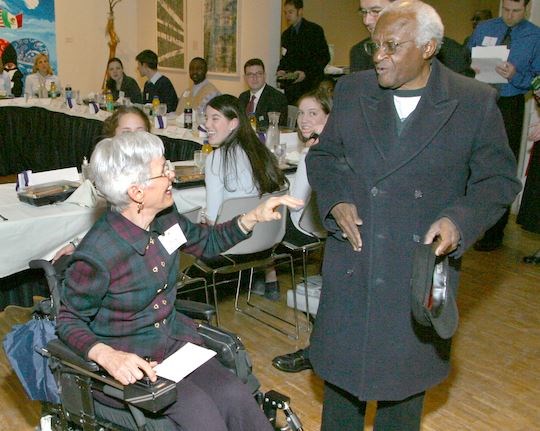 |
Many people have asked me why I wrote on refugees rather than on some other group of people or some other topic. I suppose what emerges from inside of us and becomes a book or a show or a conversation has a lot to do with our own lives, past and present. From experiences of tumultuous change in my own life, I feel a twinge of what a refugee feels when the world comes tumbling down, and life is forever different. And I know a little of what it is to be a survivor. As a woman, I can share in the lives of refugee women in a way no man can. And being a wanderer of sorts myself, I understand how refugees determine against all odds to grow where they are planted, to forever continue to compose their lives with laughter and with joy, even in the midst of pain, insecurity, and loss.” (emphasis added).
In ways she could not have anticipated, she would come to understand the meaning of displacement in a more personal sense; she would experience firsthand what it feels like to have the world tumble down, to have her own life forever transformed, and, like the displaced people of the world she had studied and accompanied, to become a true survivor.
After publishing her book, Judy served as Chair of the Women’s Refugee Commission and member of the board of the International Rescue Committee. She testified before Congress and appeared on public radio and television. And then the fateful event occurred. (Graphic accounts of that day are described in the book Visionaries (Orbis Books) and in several published articles, including the April 1997 issue of Johns Hopkins Magazine of Public Policy and International Affairs.)
In September 1993, Judy was working in southern Sudan on behalf of Refugees International. As it happened, a film crew was present that day to film a PBS documentary segment from the series “Visionaries.” In the course of filming an aerial supply drop, the cameraman captured the scene of confusion, pandemonium, and then horror, as the cargo plane missed its mark and began dropping its heavy palettes directly over the aid workers on the ground below. One of the 200-pound bags of grain landed on Judy, crushing her leg, and causing her nearly to bleed to death. Her life was saved by a relief doctor, but the agony she experienced in the field and during the airlift out of the country was beyond comprehension. In the aftermath of the accident, she would lose her leg below the knee.
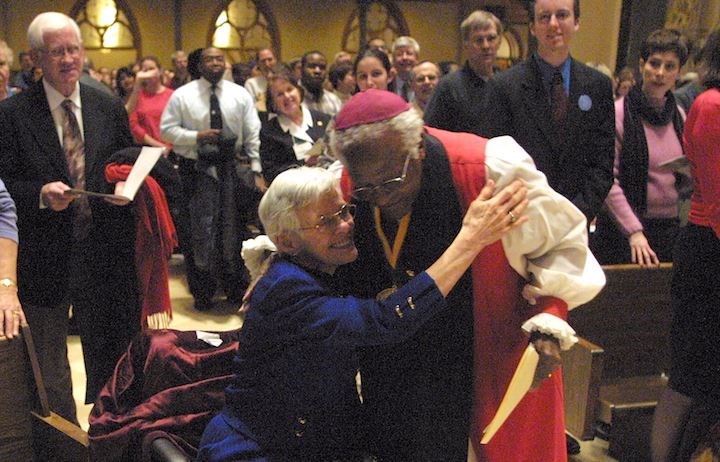 |
For many people, such a tragedy might have resulted in despair or discouragement. But for Judy it was simply another bend in the road, marking the beginning of a new phase of life. She went on to work in the Bureau of Population, Refugees, and Migration as a Special Advisor in refugee issues and policy in the first Clinton Administration. She spent years working with Archbishop Desmond Tutu in Cape Town, South Africa, helping with his efforts to promote reconciliation and healing in the post-apartheid era. Apart from serving on the board of the Desmond Tutu Peace Foundation, she was Board Chair of the Women’s Refugee Commission and served on the board of Refugees International. In 2010 she was named the first Desmond Tutu Distinguished Chair in Global Understanding for the University of Virginia’s Semester at Sea.
Her actions have won her numerous awards: the Mickey Leland Award from Refugee Voices; the 1994 Award from Refugees International; Georgetown University’s Learning, Faith and Freedom Medal; the Marymount Manhattan College Humanitarian Award; and the World Citizenship Award from the Nuclear Age Peace Foundation, among others. Judy has also taught courses in Theology, Human Rights, Women’s Studies, and International Studies at various universities including Seattle University, John's Hopkins School of Advanced International Studies, and Marquette University, where this May she will be receiving an honorary doctorate and delivering the keynote commencement speech.
In recent years she has taken an increasing interest in climate change and its growing impact on the global refugee crisis. This spring she will be leading a retreat at the Maryknoll Mission Institute in Ossining, New York on the subject of climate displacement. As she describes it, “As caregivers of creation, with Pope Francis, we will heed the call to build a culture that will face and address our ecological crisis, a culture that will ‘hear the cry of the earth and the cry of the poor.’ ”
Although Judy’s career and achievements are remarkable, even more remarkable is the effect she has on people she encounters. Her physical and emotional presence is striking; in virtually every breath she takes and in the words she speaks, Judy exudes a sense of enthusiasm, a "joie de vivre," and a deep sense of gratitude.
How has Judy attained this state of pure and comprehensive cheerful enjoyment of life, a way of life in which she both experiences and emanates a heartfelt sense of joy of everything? I believe it is the fruit of a lifetime of cultivating two key tendencies. First, she is able to flow harmoniously with whatever comes to her, to accept her “karma” cheerfully. In the words of Sri Ramakrishna, “God has so much more in store for you than you could ever imagine for yourself. Therefore, let God be your guide.” Judy’s life is filled with examples of this resilience. Second, Judy has cultivated an ability to direct her own mind in an uplifting way, to clean away the negative thoughts and feelings that are the primary impediment to the experience of joy. She is constantly speaking words of positivity that radiate from her like vibrations. As an example, when once reflecting on the accident in which she lost her leg she said with a laugh, “Fortunately, the leg knocked off was my polio leg...I’ve always been lucky.”
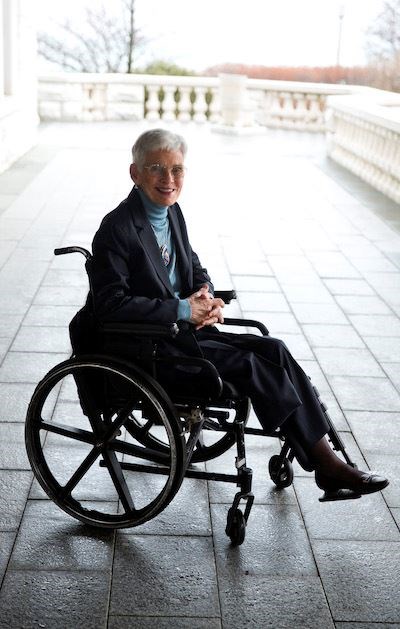 |
Her joy and humility bear a deeply spiritual aspect. In an acceptance speech for one of her many awards, she states:
“Historian/theologian that I am by training, I have come to realize that no human-devised historical event has to take place. We are rational people who choose what does and does not happen. We humans can use, and we have used, this tremendous power of choice to create catastrophe on a vast scale as well as to promote those things that bring peace and stability. We can choose to impoverish humanity and decimate Mother Earth or enrich our human family and together ‘make peace with our planet.’ We can redirect our thinking and our choices- reshape our future- for this is our world and the choices for solutions to the world’s problems will be ours as well….
May we live in a world of Ubuntu, joining together as a human community, as engaged, responsible global citizens, so that we might move toward creating a peace and openness that can take root and flourish in our homes, our communities, and our world. May we make 'chimes of gentle sound.' We can effect change if we envision that we do belong to one another; if we are willing to be 'daredevils' for peace, and if we see, in the words of Archibald MacLeish, that 'we are brothers [and sisters], riders on the earth together.'"
The word Ubuntu, from southern Africa, is one she has learned from her friend Archbishop Tutu. It signifies human togetherness—a conviction that our humanity is discovered in relationship with others. She expresses that virtue in her positive approach to life, her gratitude for whatever comes to her, and the deep connections she cultivates with others. She embraces strangers as deep friends. She is disarmingly friendly and generous. She lives and speaks from her heart. To sit beside Judy Mayotte is to be in the presence of a great being who serves a higher power. She is the embodiment of selfless service. Yet, as luck would have it, Judy is also one of the most entertaining people I have ever met. She is witty, funny, wise and humble, all at the same time. She makes you realize what you have and not focus on what you have lost. She helps you get in touch with what you are receiving, and this, in turn, helps you feel more capable of giving. She lights up the room and she lights up your heart.
I recently met Judy when she traveled all day by train from Washington, D.C. to attend the surprise 60th birthday party of her close friend Robert Ellsberg, the publisher of Orbis Books. After she had entered the banquet room in her wheelchair I found I couldn’t take my eyes off her. Later, after spending the evening with Judy, I went home and felt my life and priorities had been re-arranged. I felt that my own troubles, losses, sorrowful memories, and worries about the future were overcome by an overwhelming sense of gratitude. Since then, whenever I have found myself overcome by negative thoughts or worries, I have thought of Judy and the way she manages, meets, and greets life with such enthusiasm. I think of her generosity and kindness. And this makes me want to be more like her. She is a treasure, our treasure. She belongs to us, and we can feel change within ourselves as a result of her witness.
